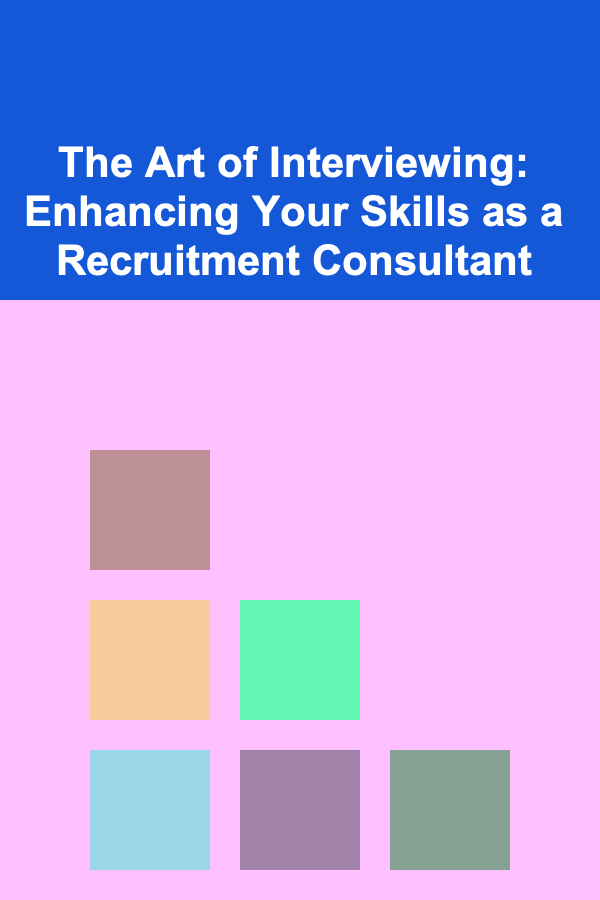
The Art of Interviewing: Enhancing Your Skills as a Recruitment Consultant
ebook include PDF & Audio bundle (Micro Guide)
$12.99$9.99
Limited Time Offer! Order within the next:

As a recruitment consultant, your role is not just about finding candidates to fill positions; it's about uncovering the right fit for both the company and the individual. One of the most crucial elements in this process is the interview. It is the point where the candidate's qualifications meet the company's needs, and your expertise can significantly influence the outcome. Whether you're interviewing candidates for technical roles or managerial positions, mastering the art of interviewing is essential. This actionable guide will explore ways you can enhance your interviewing skills to ensure you make the best hiring decisions.
Understand the Job Role Inside and Out
Before you even begin the interview process, it is imperative to fully understand the job role you are recruiting for. A comprehensive understanding allows you to assess whether a candidate is truly a fit for the position. This involves:
- Reviewing the Job Description: Thoroughly read the job description to understand the required skills, qualifications, and experience.
- Consulting with Hiring Managers: Collaborate with the hiring manager or team lead to clarify any ambiguities and gain insights into the company culture and specific team needs.
- Defining Success Metrics: Understand what success looks like in the role. Is it about meeting KPIs, managing a team, or delivering innovative solutions? Knowing this will help you identify which candidates have the potential to thrive.
By equipping yourself with this knowledge, you can tailor your interview questions and evaluation criteria to focus on what truly matters for the role.
Refine Your Interview Questioning Techniques
Interview questions are more than just a tool for extracting information---they are a strategic way to assess a candidate's suitability for the role. The key to conducting effective interviews lies in asking the right questions. Here are strategies to enhance your questioning skills:
Structured vs. Unstructured Interviews
- Structured Interviews: These involve asking every candidate the same set of questions in the same order. They provide consistency, which can help you fairly compare candidates. Structured interviews often focus on job-specific competencies and behavioral questions that predict future performance.
- Unstructured Interviews: These are more conversational and can provide insights into a candidate's personality, cultural fit, and adaptability. However, they may lack consistency and can lead to biases. To maximize the benefits, blend structured questions with unstructured ones to maintain control while exploring deeper insights.
Types of Interview Questions
-
Behavioral Questions: Use the STAR method (Situation, Task, Action, Result) to frame behavioral questions. This approach helps candidates describe how they've handled past situations, giving you insight into their problem-solving, decision-making, and interpersonal skills. For example:
- "Tell me about a time when you had to meet a challenging deadline. How did you manage it?"
-
Situational Questions: These questions test a candidate's ability to think on their feet and approach hypothetical scenarios. These are useful for assessing decision-making and problem-solving abilities. For example:
- "How would you handle a situation where you need to lead a project with tight deadlines and minimal resources?"
-
Competency-Based Questions: Ask questions to assess a candidate's technical skills and competencies relevant to the role. For example:
- "Can you walk me through your experience with data analysis tools like Excel or Tableau?"
-
Cultural Fit Questions: Assess whether the candidate aligns with the company's values and culture. For instance:
- "Describe a work environment where you feel most productive. How do you approach teamwork and collaboration?"
Open-Ended Questions
Encourage candidates to expand on their answers by asking open-ended questions like:
- "What motivates you in your professional life?"
- "Can you share an experience where you made a significant impact on a project or team?"
These types of questions provide a deeper understanding of a candidate's thought process and work ethic.
Sharpen Your Listening Skills
Effective interviewing is not just about asking the right questions but also about listening actively to the answers. As a recruitment consultant, you need to develop excellent listening skills to pick up on subtle cues that can tell you more than the words alone. Here's how to sharpen your listening:
- Give Space to Respond: Don't rush to fill every silence. Allow candidates time to think and respond. Sometimes, a pause is where the most thoughtful answers emerge.
- Observe Non-Verbal Cues: Pay attention to body language, eye contact, and facial expressions. Non-verbal communication can provide additional context to what the candidate is saying and help you gauge their confidence, sincerity, and comfort level.
- Listen for Values and Motivations: Look beyond the technical qualifications. Pay attention to what drives the candidate, their passions, and how they align with the company's goals and culture. Listen for underlying motivations that explain their career trajectory.
- Clarify Ambiguities: If you're unsure about an answer, don't hesitate to ask follow-up questions or request clarification. Ambiguous responses may signal either a lack of clarity or a lack of transparency.
Master the Art of Evaluation
After conducting an interview, the next challenge is to evaluate the candidate. Effective evaluation goes beyond simply ticking off qualifications and skills---it requires a holistic assessment of the candidate's potential. Here are key factors to consider when evaluating a candidate:
4.1 Assess Cultural Fit
Cultural fit is one of the most critical aspects to evaluate, as it determines how well the candidate will integrate into the company's environment. During the interview, assess:
- Communication Style: Does their communication style align with the company's culture?
- Work Ethic: Do they seem aligned with the company's pace, work-life balance, and team-oriented approach?
- Core Values: Do their personal values align with the company's mission and values?
4.2 Skills and Experience
This is where you evaluate the candidate's technical qualifications and professional background. Assess whether they possess the skills necessary to perform well in the role. Don't just rely on their resume---dig deeper into their actual experience.
- Technical Proficiency: Are they well-versed in the tools, technologies, or processes that are essential for the job?
- Problem-Solving Abilities: How effectively did they respond to situational or competency-based questions? Did they demonstrate critical thinking and resourcefulness?
4.3 Potential for Growth
While you're focused on the current role, it's important to assess the candidate's long-term potential within the company. Ask yourself:
- Adaptability: How open is the candidate to learning new skills and taking on challenges?
- Ambition: Are they seeking growth and advancement within their career, and can the company support this trajectory?
4.4 Emotional Intelligence
Emotional intelligence (EQ) is crucial for teamwork and leadership roles. Candidates with high EQ can manage their emotions, empathize with others, and navigate social complexities. During the interview, assess how they handle feedback, conflict, and stress.
Create a Comfortable Interview Environment
The interview process can be intimidating, especially for nervous candidates. A good recruitment consultant knows how to make the candidate feel comfortable, which in turn helps them open up and perform at their best.
- Build Rapport Early On: Start the conversation with light, non-threatening topics to make the candidate feel at ease. This will help them transition into the more serious part of the interview.
- Be Respectful and Empathetic: Show empathy by acknowledging the candidate's experience and perspective. A respectful environment encourages open dialogue and honesty.
- Maintain Professionalism: While creating a comfortable environment is essential, maintaining professionalism is equally important. Stick to the agenda, and avoid straying too far off topic.
Use Technology to Enhance Your Interviewing Process
In today's digital age, technology can significantly enhance your interviewing process. Tools such as video conferencing software, AI-powered interview platforms, and recruitment management systems can streamline and improve your interviews. These tools can help with:
- Scheduling: Use scheduling tools to streamline the process and reduce the back-and-forth emails.
- Video Interviews: Conducting interviews remotely is increasingly popular and can save time for both the consultant and the candidate.
- AI-Assisted Screening: Some AI tools can help assess resumes and pre-screen candidates before scheduling an interview, ensuring only qualified candidates are brought forward.
Continuous Improvement
To stay ahead in the recruitment field, consistently assess and refine your interviewing techniques. Gather feedback from candidates and hiring managers to identify areas for improvement. Additionally, stay informed about industry trends, new interview methodologies, and candidate expectations to continuously improve your interviewing skills.
Mastering the art of interviewing is an ongoing process. By taking the time to understand the job, asking insightful questions, listening attentively, evaluating holistically, and creating a positive environment, you will increase your ability to make sound hiring decisions. As a recruitment consultant, your skill in conducting interviews not only reflects your professionalism but also directly impacts your clients' success and the careers of the candidates you place.
Other Products

How to Add Holiday Spirit to Your Kitchen with Subtle Decor
Read More
How to Create a System for Managing Bills and Finances
Read More
How to Prevent Pet Hair from Taking Over Your Home
Read More
How to Protect Your Dropshipping Store from Fraud and Chargebacks: An Actionable Guide
Read More
How to Use ETFs to Diversify Your Investment Portfolio
Read More